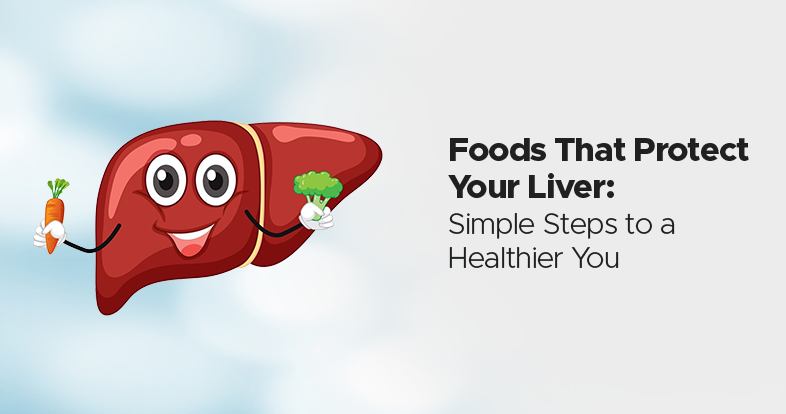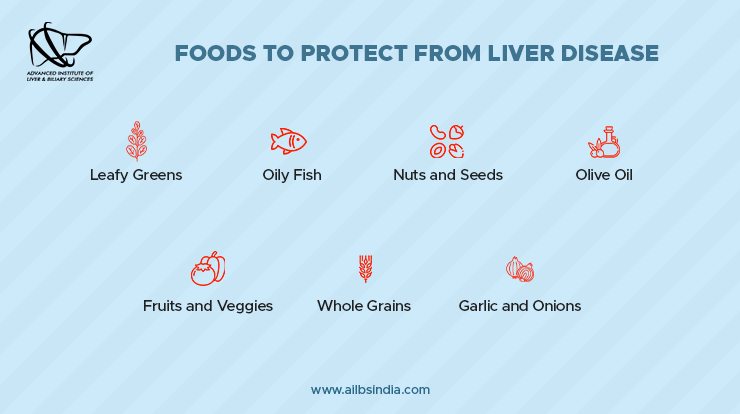Foods That Protect Your Liver: Simple Steps to a Healthier You
![]()

A balanced diet plays an important role in health and wellness, especially when it comes to nurturing liver health. The liver is a silent yet vital organ that plays a pivotal role in our body’s detoxification process, aids in digestion, and performs numerous other functions that are essential for our overall well-being. A diet rich in certain nutrients can help cleanse the liver, reduce inflammation, and even repair liver cells. The link between diet and liver health is not just about prevention; it is about empowerment. By choosing liver-friendly foods, you take an active role in managing your health and well-being. This proactive approach is particularly important for those at risk of liver conditions or those already managing liver issues. So, let’s explore the best foods to protect from liver disease.

Foods to Protect from Liver Disease
Include these foods in your diet to take effective steps to protect your liver and improve your overall health. Remember, simple changes in what you eat can make a big difference!
- Eat Leafy Greens Regularly: Spinach, kale, and other leafy vegetables are like a cleaning service for your liver. They help wash out toxins and keep your liver working smoothly.
- Include Oily Fish in Your Diet: Fish like salmon and mackerel are full of good fats called omega-3s. These fats calm down inflammation and keep your liver in good shape.
- Nuts and Seeds: Almonds, walnuts, and seeds like flaxseeds are not just tasty snacks. They are full of vitamin E and healthy fats that protect your liver from getting damaged.
- Use Olive Oil for Cooking: Olive oil is a healthy fat that is good for your heart and liver. It helps manage your liver enzymes and keeps your weight under control.
- Fruits and Veggies: Berries, beetroots, and carrots are packed with antioxidants. These substances help your liver do its job and keep it healthy.
- Choose Whole Grains: Swap white bread and rice for whole-grain versions like brown rice and whole wheat. These foods are full of fiber, which helps you maintain a healthy weight and a healthy liver.
- Garlic and Onions: These kitchen staples are good for more than just flavor. They contain natural chemicals that help clean out your liver.
Lifestyle Changes You Should Make
In addition to a liver-friendly diet, including certain lifestyle changes can significantly bolster your liver’s health. These changes go hand in hand with your dietary efforts, creating a comprehensive approach to protect and nurture your liver.
- Stay Hydrated: Drinking enough water is essential for liver function. It helps the liver to flush out toxins more efficiently. Aim for at least eight glasses of water a day.
- Regular Exercise: Physical activity is a boon for your liver. It helps burn triglycerides for fuel and can reduce liver fat. Find an activity you enjoy, whether it’s walking, swimming, or yoga, and make it a regular part of your routine.
- Limit Alcohol Consumption: Alcohol can be harsh on your liver, especially if consumed in large amounts. Reducing alcohol intake can prevent additional liver strain and damage.
- Avoid Toxins: Toxins can injure liver cells. Limit direct contact with toxins from cleaning and aerosol products, insecticides, chemicals, and additives. When using such products, ensure proper ventilation and wear a mask.
- Maintain a Healthy Weight: Being overweight can lead to fatty liver disease, which hampers liver function. Achieving and maintaining a healthy weight through diet and exercise can significantly improve liver health.
- Manage Medications: Some over-the-counter and prescription medications can stress your liver if taken excessively or combined with alcohol. Always follow the prescribed dosages and consult your doctor about the impact on your liver.
- Get Regular Health Check-ups: Regular check-ups help monitor liver health and catch any issues early. Routine blood tests can check for liver function and prevent potential problems.
- Rest and De-stress: Chronic stress can negatively impact your liver. Incorporate stress-reduction techniques such as meditation, deep breathing, or hobbies that relax you.
- Quit Smoking: Smoking not only affects your lungs but also your liver. Chemicals in cigarettes can damage liver cells and worsen liver problems.
Conclusion
Understanding this connection between diet and liver health can be your first step toward a healthier lifestyle. When these foods to protect from liver disease and lifestyle changes are not enough, it is essential to turn to the experts. Dr. Vivek Vij and his team recognized as the best liver transplant surgeon in India, stand at the forefront of liver healthcare. Their expertise and compassionate care have transformed the lives of many liver patients. For those facing liver challenges, Dr. Vij is the best liver transplant surgeon in Delhi who represents the pinnacle of hope and healing. Choosing their services means entrusting your health to the best liver transplant doctor in India. With their guidance, a combination of the right diet, and expert medical care, you can start your journey to liver wellness and a healthier, happier life.
FAQs
1. Can Diet Really Prevent Liver Disease?
Ans. Yes, absolutely! Eating the right foods can help keep your liver healthy. Foods rich in antioxidants and good fats can protect your liver from damage and even help it repair itself.
2. Is Exercise Important for Liver Health?
Ans. Definitely, regular exercise helps burn fat that could otherwise build up in your liver. It also boosts overall liver health, which in turn keeps your liver functioning well.
3. Can I Reverse Liver Damage with Lifestyle Changes?
Ans. In many cases, yes. If the damage is not too severe, making changes like eating a healthy diet, exercising, and avoiding alcohol can help your liver heal and regain its function.
4. How Often Should I Go for Liver Check-ups?
Ans. It’s a good idea to have regular health check-ups, including liver function tests, especially if you have risk factors for liver disease. Your doctor can tell you how often you should be tested based on your health.




